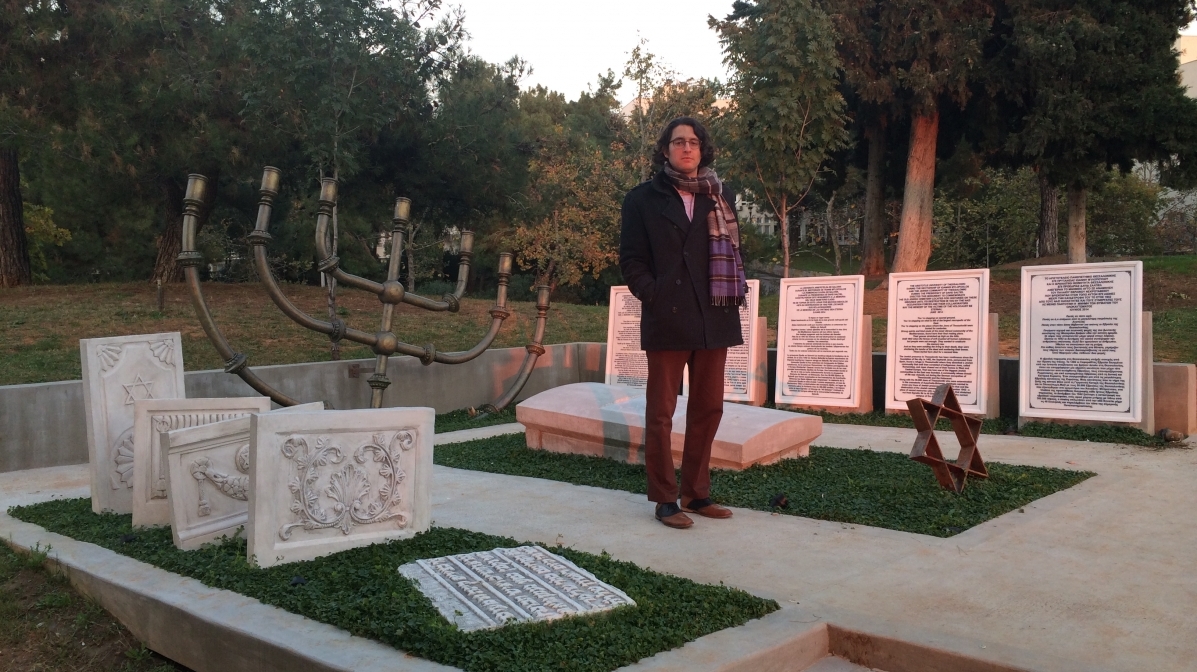
Devin Naar visits the new monument at the University of Thessaloniki commemorating the Jewish cemetery that used to exist there. Photo credit: Iosif Vaena.
This past fall in Salonica, I spoke on sacred ground about the past and future of Greek Jewish history.
Once home to the largest Ladino-speaking Jewish community in the world, Salonica (Thessaloniki), the second biggest city in Greece today, lost nearly all of its Jews as a result of the Holocaust, during which the Nazis deported close to fifty thousand people to their deaths at Auschwitz. Almost all the remnants of the centuries-long Jewish presence in this once cosmopolitan city—from the more than three dozen synagogues to the vast Jewish cemetery—were obliterated, partly at the initiative of local Greek Orthodox residents and leaders themselves.
Now, more than seventy years later, Salonica is undergoing a process of reassessing its past, rediscovering its Jewish heritage, and seeking to come to terms with one of its darkest chapters, as it, along with the rest of Greece, forges a path forward amidst the continued economic crisis and accompanying political turmoil.
Thanks to support from the American consulate, I travelled to Salonica in the autumn of 2014 to participate in an international conference about the Holocaust in Greece—the first one sponsored in part by the municipality itself—and to deliver a lecture at the city’s Aristotle University, one of the largest universities in the country whose campus sits exactly on the spot where the vast Jewish cemetery once stood. The Holocaust conference, which drew local researchers as well as some of the top scholars in the fields of Holocaust and genocide studies from across the world, constituted a turning point and a sign of the changing times. H-Net published a review of the papers. The gathering also symbolized a broader openness on the part of the city leadership and university administration to break the long-standing silence regarding the city’s Jewish past as well as its erasure from the urban fabric and official public memory. I’d like to think that my lecture at Aristotle University also contributed to this trend.
Salonica, however, sits at the crossroads of competing political and cultural trends, with the rise of the far right, outwardly xenophobic, antisemitic, anti-Muslim party, Golden Dawn. I described my observations about some of these trends in 2013 in a cover story for the Jewish Review of Books following my visit to Thessaloniki for a 2012 conference. In that essay, I lamented that approximately seventy years after the Second World War, the Aristotle University of Thessaloniki still had not yet officially recognized the fact that its campus sat on top of the once expansive and historic Jewish burial ground; not even a small monument had been erected. My visit this past autumn coincided with the erection of the first-ever monument on the campus of the university that indicates the site’s previous use as a burial ground, but the wording and the actors to whom responsibility for the destruction is attributed has sparked another controversy.
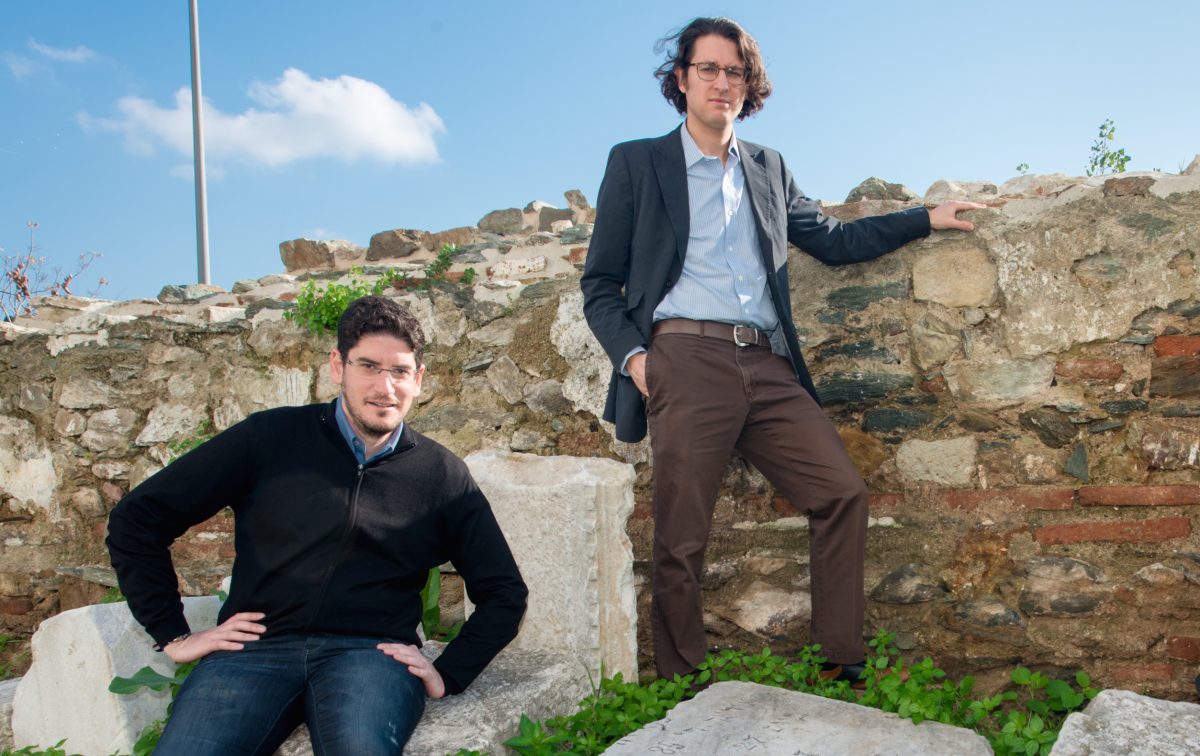
A new generation of scholarship on Greek Jewish history: Devin Naar and Leon Saltiel beside scattered tombstones from the Jewish cemetery of Salonica, November 2014. Photo Credit: Argilo Mitilinou.
In addition to the creation of the monument to the Jewish cemetery (which has already been desecrated), the Aristotle University and the Jewish Community of Salonica are seeking to establish an unprecedented chair in Jewish history that would perhaps also provide opportunities for students and scholars to learn the historic local Jewish language, Ladino (Judeo-Spanish). This is a very exciting opportunity and I wish my colleagues in Thessaloniki great success, and it was with this goal in mind that I conceptualized the lecture that I gave at the University during my visit this past fall.
In the lecture, I described attempts by local Jewish and Orthodox Christian intellectuals to achieve greater rapprochement between the city’s populations during the 1920s and 1930s. One of the ways they sought to do this was through education, both among Jews and Orthodox Christians, at the elementary and high school level, as well as at the university level. I described the processes through which Aristotle University hired a professor of Jewish history and Hebrew literature and sought to incorporate Jewish studies into the curriculum for the first time. That position dissolved in the mid-1930s. Since then, there has been no scholar at the university specifically responsible for teaching Jewish history—a phenomenon that may very well change with the new plans for a chair of Jewish history.
Given the dynamics of the situation and my own family connection to the city, I decided to provide prefatory remarks about the symbolic significance and emotionally charged nature of my lecturing at the University of Thessaloniki’s campus, under which I knew my own ancestors, for four centuries or more, had been buried and of which no trace remained. I spoke, hesitantly, and almost overwhelmed with emotion, first in Greek, because I wanted to make my point very clear to all those assembled in the language of the country; and then in Ladino, because I wanted people to hear the sounds of a language that once used to be as much a part of the city as any other.
Ladino: the Jewish language that once could be heard in every corner of town and which has long since disappeared from Salonica’s soundscape. This language, from my perspective, was once just as much a Jewish language as a Salonican language, and this point must be understood and accepted. One newspaper commented that my remarks in Ladino constituted the first time that the language was spoken publically since the 1930s. I am not entirely sure if that is the case, but if it is, I am very proud of it.
Here is a recording of my remarks in Greek and Ladino:
The international conference, my visit and my lecture at the university attracted quite a bit of press attention (see, for example, a piece in the newspaper of Northern Greece, Voria). At this link please find the translated interview with me that appeared in December 2014 as a cover story in Epiloges, the literary supplement of Makedonia, one of the most important newspapers in the city (click here for the original Greek-language publication).
There is a symbolic significance to the fact that my words, photographs of me, and images of Jewish tombstones—some still scattered about the city and used as building material—have now appeared in Makedonia in a sympathetic light and as a result of genuine public interest and concern. This is especially notable because in 1931, amidst the Great Depression, the editor of Makedonia stirred up an unprecedented wave of popular antisemitism that culminated, that summer, in the only major pogrom perpetrated in the history of Thessaloniki. The magazine also ran an excellent article focused on the research of my friend and colleague, Leon Saltiel, a native of Thessaloniki, whose PhD dissertation focuses specifically on the destruction of the city’s Jewish cemetery.
Poetic justice?
Finally, for making my visit both possible and extremely rewarding, I would like to thank Robert Sanders, American Consul, and Ioanna Koutsounanou, the public affairs specialist at the American Consulate General in Thessaloniki; Dr. Giorgos Antoniou at the International Hellenic University, Dr. A. Dirk Moses, European University Institute-Florence, and the Journal of Genocide Research for organizing the conference; Dr. Antoniou, Dr. Vassilis Gounaris, Dr. Eleni Hondolidou, and Dr. Demetrios Mavroskoufis, dean of the School of Philosophy at the Aristotle University of Thessaloniki, for hosting my lecture at the university; and David Saltiel, president of the Jewish Community of Thessaloniki, for his encouragement and continued efforts to bring the city’s Jewish past—and present—out from beneath the shadows.
Links for Further Exploration
- Sephardic Jews and the Holocaust: In Search of Uncle Salomon (JewDub Talks 2012, YouTube Video)
- The Jewish Museum of Thessaloniki: https://www.jmth.
gr/

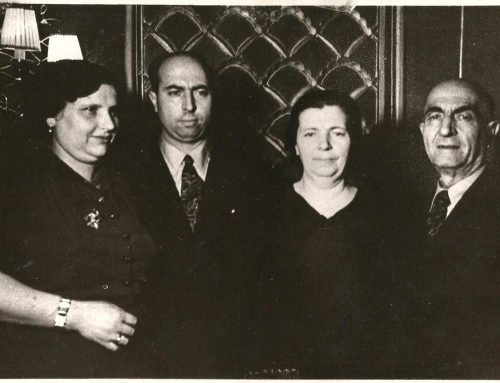
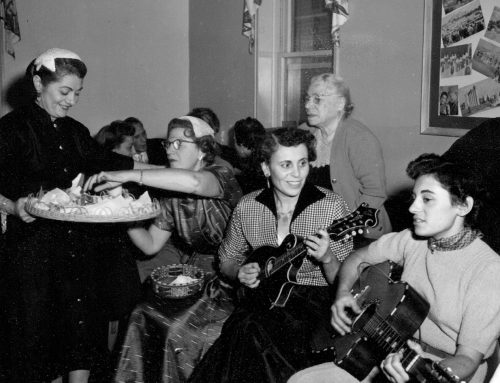
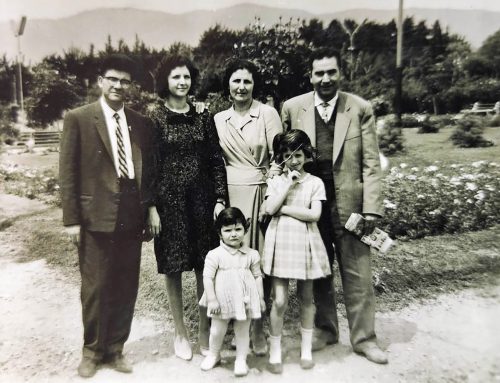
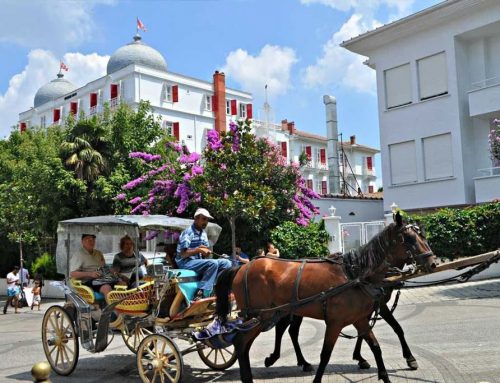
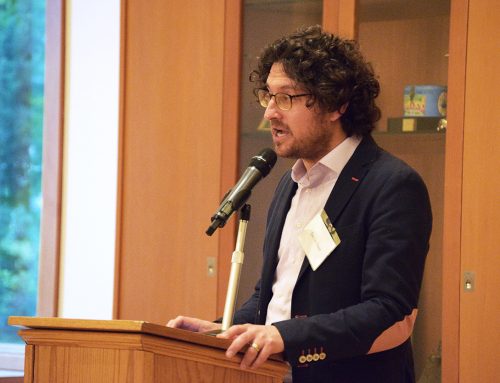
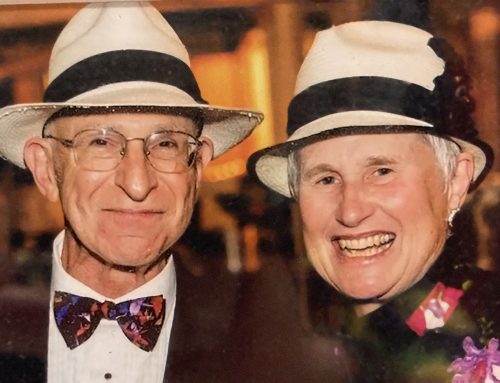
Thank you! Fascinating and sad. As a young mother, living in Bethesda MD in the late ’60s (then husband NIH fellow), I participated in a workshop on the making of “Oriental rugs,” with an elderly Armenian woman, originally from Thessaloniki.She was shocked that I and others in the group didn’t know about the Armenian genocide which had forced her family out. I don’t know if my memory re her story is correct or if her story is related to the history of the Jews in Thessaloniki? But here is yet another reason your course on “Jewish Cultural History” is so illuminating for me. I also was delighted to listen to your remarks in Greek and Ladino, and to realize my poor Spanish actually allowed me to understand most of the Ladino. (Never too late to learn!) Gratefully, Joella Werlin
Munchas grasias, Devin Naar, por tus ermozos biervos en muestra kerida lingua! Las almas de tus nonos sunriyen, siguramente. Mazal bueno (congratulations and good luck – todos los dos)!
Me plaze muncho ke ay oy en Salonik un mansevo kon el nombre Leon Saltiel. Yo mizma tinia un elevo de la famiya Barzilay de Salonik, ke surbivio tambien, grasias al Dio.
Anyos antes me konto una mujer ke vijito a Salonik ke estavan ambezando el ladino en las eskolas publikas aya. Ke empesen de muevo, ya es sus erensia!
Abrasos,
Gloria
thànk you for this great article in English so i could understand. Thank you for what you are doing. My father was from Thessaloniki and i am looking for all i can find about this city during this period.
Happy to read there is a public movement to combat the Judaic anti-semitism in the Mediterranean area. Even though I was born in the USA, I have a strong tie to Rhodes, Turkey and Greece. I was saddened to see the very commonplace disrespect for Jews, which was rampant there, during my travels in the last part of the millennium.
I know it exists here in the USA too, but people seem to “hold their tongues” (have a more civil approach to religious hatred. There, they just tell you how they feel! I was shocked. (at least there -one knows what one is dealing with.)
Best wishes for a compassionate world.
Solo kedaran museos de djidios in las sivdades ande bivyeron durante siglos.
Egzaktamente komo in Ametica ande la kultura de los nativos americanos disparesyo i ande solo keda unos museos.
Kedar pokos no permete de arebivir o mantener lo muestro.
Renaud
I was happy to read this article and to hear that a memorial was finally erected. My parents who grew up in Thessaloniki, survived the war and married emigrated to the U.S. in 1955. My brother and I were born there. Ladino was the language spoken in our home growing up. I remember from an early age hearing about the fate of the Jewish Cemetery from my parents and their friends. It was very upsetting it was to them, especially my Father because he said he did not have a grave to visit.. I am sorry that neither of them are alive today to hear about this memorial.
Yo tamben do grasias como Gloria por por tus palavras. Tantos anyos de buscar informasion en Ladino i recordar los sefardim Salonikis. Grasias a Dio por fin!
Thank you for such a wonderful article, I am actually a Sephardi Jew, truthfully, a mix of Middle Eastern stock.
In Greece, the family dynamic is so strong, that we were so wiped out there. Hearing Greek, which I did understand some, having been exposed to it as a child, and hearing Ladino was music to my ears. Thank you for your insight.
Devin dear,
I am bursting with pride because of your many MEANINGFUL accomplishments on behalf of the Sephardim. Your are the marvelous and knowledgeable scholar that we have needed to represent us – a minority within a minority – and to make the rest of the world aware of our grand culture. May you go from strength to strength.
Keep well and keep going. Hazak u baruch.
Joy Zacharia Appelbaum
To my dear friend Devin: It is with a deep sense of admiration and awe that I write to you about your speech given at the University of Thessaloniki. I was impressed by your talk in Greek, and cried like a baby hearing your talk in Ladino. I truly hope you were heard. You accomplished a magnificent mission, and I pray that the words you spoke will ring true and that real justice will be done. Mashala y chazak y baruch.
Estimado Devin, leer tu articulo y ver lo involucrado en la historia de esta comunidad que casi des aparecer de Grecia es excelenete, mi familia de mi papa era de Salonika apellido Serrero Adroki, mis abuelos, tías y tio fueron llevados a Auswitz, mi papá único sobreviviente de su familia, me gustaría saber y contactarte para infórmame si hay manera de obtener más detalles y forma de conseguir con alguien que pueda ayudar con partidas de nacimiento de Salonika. Gracias. Excelente trabajo.
I will have to look for your book. Every year, we still do Passover in Ladino. It’s always sad to visit the relatives in Thessaloniki because I see pictures of all the people who died on their mantles. My husband is originally from Athens. His uncle Isaac Nehama (recently deceased) was working with a lawyer trying to preserve Ladino in a translating program. Every once in awhile my husband blurts out something in Ladino. My favorite exasperation is “huevos”.
Susan,
My name is Brian Berman. I am the lawyer who had the honor and privilege of working with your husband’s uncle, Isaac. I was first introduced to Isaac through Devin (one of my closest friends from college) while Isaac and I were attending a speech Devin was giving in New York. Isaac and I volunteered together at the United Holocaust Memorial Museum cataloging Ladino materials. We also worked together to translate a book telling the incredible personal account of a woman from Monastir (https://www.sephardicstudies.org/monastirwj_book_author.html).
Working with Isaac inspired me to build the first-ever Ladino transliteration site that allows Ladino speakers to convert their Ladino writing into Solitreo, the old writing system of Ladino. The site is available at https://www.ladinotype.com, although I must admit it was built with now-outdated technology and has been neglected over the years due to time constraints. I am in the process of completely rebuilding it from scratch with modern technology and modern features, an update I know Isaac would be proud of.
I dearly miss Isaac and my work with Ladino has definitely been limited lately due to other commitments. I’m just glad that donors come together to support incredible scholars like Devin to allow him to do the very important work that he does. The Ladino language and the larger Sephardic world are such an important part of the ongoing Jewish story.